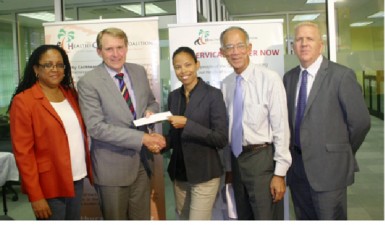The Australian High Commission Direct Aid Program has awarded a US$112,800 grant to the Healthy Caribbean Coalition (HCC) to fund five regional projects aimed at boosting the capacity of key civil society groups to respond to community-based needs for cervical cancer prevention.
At the HCC offices on Friday November 29, Ambassador Ross Tysoe presented the cheque to the group, a press release issued by the cancer Institute of Guyana Inc (CIG) said.
The recipient organisations in the five OECS countries are The Belize Cancer Society (BCS), Belize;

The Dominica Cancer Society (DCS), Dominica; The Grenada Cancer Society (GCS), Grenada; CIG, Guyana; and The Jamaica Cancer Society (JCS), Jamaica. The goal of the project is to help the groups respond more effectively to the community-based needs for cervical cancer prevention, treatment and control.
“The Caribbean Civil Society Cervical Cancer Prevention Initiative (C4PI) seeks to improve the capacity of CSOs [Civil Society Organisa-tions] to positively impact the continuum of cervical cancer care and avert cervical cancer related deaths,” the press release said.
The C4PI supports PAHO’s “Regional Strategy and Plan of Action for Cervical Cancer Prevention and Control in Latin America and the Caribbean;” the internationally and regionally agreed goal of 80% coverage in cervical cancer screening by 2025; the WHO Best Buy Interven-tions; the Declaration of Port of Spain; and the Declaration for Universal Access to Cervical Cancer Prevention.
According to the release, Professor Trevor Hassell, president of the HCC, in thanking Ambassador Tysoe, noted that the project “exemplifies the role of the HCC as an organisation building the capacity of regional CSOs by adding value to their daily operations and directly impacting the achievement of their respective organisational missions.”
Echoing these remarks, HCC Manager Maisha Hutton said the organisation is proud to assist member NGOs in this critical area of cervical cancer, through new efforts aimed at reaching traditionally underserved women.
In response, the ambassador said his government, through its Direct Aid Program, is proud to partner with the HCC to combat cervical cancer in the region. C4PI will provide cervical cancer screening and education services to women, many of which will come from remote and rural areas, with limited access to information and quality healthcare.
“This is very much in the spirit of our DAP Program, which is aimed at advancing developmental objectives and addressing humanitarian hardships at the grassroots level, and emphasizes disadvantaged or marginalized groups. The Australian High Commis-sion in Port of Spain, Trinidad, which manages [the Program] in the region, takes this opportunity to congratulate the HCC for the design of this project, and to wish them, and the organisations with which they collaborate, the greatest success in this worthy initiative,” Tysoe said.
Additionally, the Cancer Institute of Guyana said it is pleased to be included in the initiative and will strive to ensure that all women are served in keeping with its mission “to reduce cancer’s impact through compassionate care and innovative educational and outreach activities.”
In the press statement, the institute said, “We believe that each patient should receive considerate and respectful care/services, regardless of their race, creed, color, national origin, religion, age, diagnosis, disability, etc., and that also takes into consideration the patient(s) values and beliefs.”
Recognising the challenges inherent in serving a large geographic areas and population the institute is collaborating with the Health Ministry in this effort and is committed to providing screening services across the country. The institute aims to establish a social educational network of health care providers and other health facilities to promote early detection and prevention of cancer among the population.
“Too many women are dying because they cannot afford the screening for cervical cancer or they live too far to access health facilities,” the institute said.
According to the HCC, every year over 500,000 women develop cervical cancer globally. In the Caribbean, 2,245 women die of cervical cancer each year; this translates to about six women dying every day – entirely unnecessarily.
The Caribbean is among the top four highest sub-regions in the world with respect to the incidence of cervical cancer and has the highest burden of HPV in the Americas.
“Cervical cancer is the second leading cause of death among Caribbean women with death rates several magnitudes higher than countries such as the USA,” the release said. It added that more than 95% of cases of cervical cancer can be prevented. This requires widespread awareness, increased screening and effective prevention and control measures that include Pap Tests, HPV testing, VIA (visual inspection using acetic acid) and vaccination against HPV.









